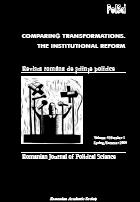Political Institutions and the Democratisation of Post-Communist Eastern Europe (1989-2000)
Political Institutions and the Democratisation of Post-Communist Eastern Europe (1989-2000)
Author(s): Svetlozar A. AndreevSubject(s): Politics / Political Sciences
Published by: Societatea Academică Română (SAR)
Keywords: Communist bloc; institutional imports; political forms; trust; legitimacy;
Summary/Abstract: European, the newly established political regimes have opted for diverse combinations of institutional formats. Huge differences in the institutional setting have been observed not only among subregions, but also among neighbouring countries within the former Communist Bloc. This paper attempts to analyse the various institutional choices made by the political elites and tries to see how they affect the consolidation and quality of democracy. Its main hypothesis is that the selection of a particular kind of executive structure (presidential, semi-presidential or parliamentary), of legislature (single or double chamber), of political parties (massbureaucratic and electoral-professional, and their effective number in parliament) and of electoral system (majoritarian, mixed or proportional), as well as the combination between these institutions, would influence the general performance and stability of political democracies in the region and world-wide.
Journal: Romanian Journal of Political Sciences
- Issue Year: 2004
- Issue No: 01
- Page Range: 37-50
- Page Count: 14
- Language: English
- Content File-PDF

